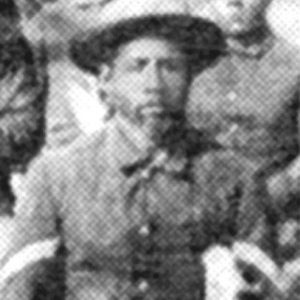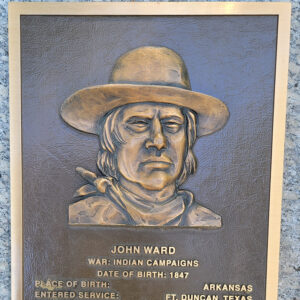calsfoundation@cals.org
John Ward (1847–1911) [Medal of Honor Recipient]
John Ward was an African-American U.S. Army scout born in Arkansas who received a Medal of Honor for his actions in a battle with Comanche Indians in Texas in 1875.
John Ward was born in Arkansas in 1847 (the exact location is unknown), and his parents were either both black and Seminole or they were African Americans who lived among the Seminole; given his birth date, he may have been born during the forced removal of the Seminole from the southeastern United States. The Ward family was among several hundred black and Seminole people from the Seminole Nation in the Indian Territory who received permission to immigrate to northern Mexico in the late 1840s, where the African Americans were safe from the possibility of enslavement in the United States.
Following the Civil War, the expatriates were invited to rejoin the Seminole Nation in the Indian Territory. John Ward came back to the United States on July 4, 1870, and he married Julia Wilson in a Seminole ceremony officiated by the Reverend Job Bruner; they would have seven children. On August 16, 1870, he enlisted in the U.S. Army at Fort Duncan, Texas, as a scout, a role in which he used the skills he had learned fighting the Comanche in Mexico. Ward and his fellow black Seminole scouts were paid forty cents a day and were required to furnish their own horses. Though well-armed, they did not conform to traditional army norms: one officer reported: “Discipline, Fair; Instruction, Progressive; Military Appearance, Very Poor; Arms, Spencer Carbines—Good; Accoutrements, Good; Clothing, Fair.”
Ward was apparently a good soldier and, by 1874, had risen to the rank of sergeant, the rank he held when he took part in the action for which he won a Medal of Honor. Sergeant Ward, Private Pompey Factor, and Trumpeter Isaac Payne were on a scouting expedition in April 1875 with Lieutenant John Lapham Bullis, a Civil War veteran who had served as a captain in a U.S. Colored Troops regiment. The keen-eyed scouts spotted traces of a herd of about seventy-five horses on April 22, and the small party followed them for three days. On the morning of April 25, they caught up with the herd and twenty-five to thirty Comanche Indians at the Eagle’s Nest Crossing of the Pecos River. Despite the disparity in numbers, the four soldiers tethered their horses and crept up to within rifle range of the Indians.
For the next forty-five minutes, a spirited fight ensued in which three Comanche were killed and one was wounded. The U.S. soldiers realized they would soon be overrun. They fell back toward their horses, and three of the scouts mounted, but Bullis’s skittish mount ran away. As the Comanche closed in on the stranded commander, Ward called on his comrades to come to his assistance. Ward raced up to Bullis and pulled him onto his horse behind him, even as a bullet cut through Ward’s rifle sling and shattered his rifle stock. The four men rode away, with Bullis reporting that they “just saved my hair.”
Based on Bullis’s recommendation, all three scouts received a Medal of Honor, with Ward receiving his on May 28, 1875, for “gallantry in action with Indians.” Ward remained with the scouts until October 1894, when severe rheumatism he had contracted in 1878 prevented him from being able to mount his horse. He received a pension each month until his death on May 24, 1911; his widow got a monthly check until her death in 1926. John and Julia Ward are buried in the Seminole Indian Scout Cemetery at Brackettville, Texas.
For additional information:
Johnson, John Allen. “The Medal of Honor and Sergeant John Ward and Private Pompey Factor.” Arkansas Historical Quarterly 29 (Winter 1970): 361–375.
Porter, Kenneth Wiggins. “The Seminole Negro-Indian Scouts, 1870–1881.” Southwestern Historical Quarterly 55 (January 1952): 358–377.
Schubert, Frank N. Black Valor: Buffalo Soldier and the Medal of Honor. Wilmington, DE: Scholarly Resources, 1997.
Mark K. Christ
Little Rock, Arkansas
 Civil War through Reconstruction, 1861 through 1874
Civil War through Reconstruction, 1861 through 1874 Military
Military John Ward
John Ward  John Ward Plaque
John Ward Plaque 




I have written a musical about John Lapham Bullis. We are performing it on May 19 and 21, 2023, at Macedon Academy, Macedon Center, New York. It is where Bullis went to school. John Ward is the narrator.